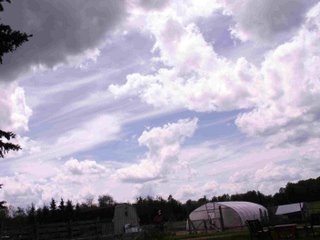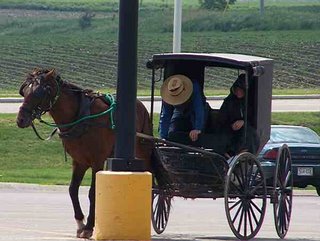Renewable Energy & Sustainable Living Fair
Me and my buddy Dan went to the Renewable Energy & Sustainable Living fair hosted by the Midwest Renewable Energy Association in Custer, WI. It was a three day event in which we went to the first two days worth on Friday and Saturday. It has been an annual gathering for the last 16 years and this year there was an expected turn out of between 15,000 and 16,000 people. By the looks of it I’d say they must have been pretty close in their estimations.
People from all over the world attend.
There were over 160 workshops taught by experts in the fields of renewable energy, energy efficiency, and sustainable living. There were more than 200 exhibitor boot
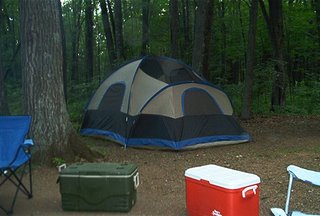 hs filled with business and organizations offering related products and information.
hs filled with business and organizations offering related products and information.Dan and I headed out early Friday morning and set up a camp site at a camp ground not far from the event. We packed plenty of food and enjoyed a tasty meal over an open camp fire. You might notice there are 4 large burgers starting to cook over the fire. Needless to say we were stuffed that evening.
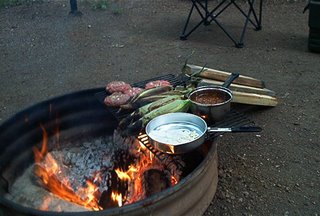
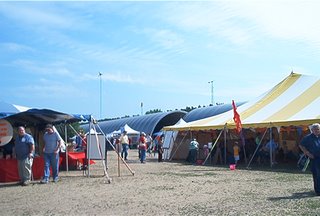
When we arrived at the fair we saw a multitude of tents which were set up for the workshops and beyond that were some hoop buildings which housed many of the exhibitor booths. There were many more spread out beyond the buildings.
We got there early and had a chance to visit some of the booths before the workshops started. There were tons of various kinds of solar panels on display and everything having to do with the operations of running alternative energy. At the farthest end of the fair they had an area devoted to vehicles powered by alternative fuels. I was particularly impressed with the “veggie oil” powered ones, which I will talk in more detail about in a bit.
I was duly impressed with the number of workshops of which included many topics most of us are interested in. There was so many I couldn’t attend all that I wanted to. There were up to 14 workshops per hour which you could chose from. Some of which were repeated a couple times in the course of the three
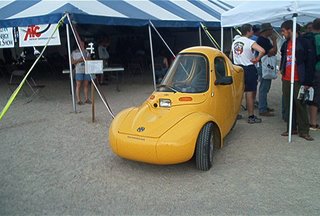 days which was nice.
days which was nice.I personally attended a dozen workshops. Here are the ones I went through the two days we were there so that you can see the kinds of topics that were covered. I’ll list them in the order which I attended them, starting Friday morning going through Saturday. The Workshops ran from 10 am to 5 pm.
1. Stuff You Can Do With Junk 2. Earth Sheltered Housing & Living Roofs taught by Rob Roy 3. Site Analysis For Wind taught by Mick Sagrillo 4. Solar Air Systems For Space Heat taught by Bill Hurrle 5. Building With Earth Blocks taught by Dan Johnson 6. Connect A Small Renewable Energy System to the Utility taught by John Hippensteal 7. Geothermal Heating and Cooling taught by Leo Udee
That was all on Friday.
Saturdays line up began…..
8.Timber Framing taught by Rob Roy 9. Straw Bale Construction in the Midwest taught by Mark Morgan 10. Processing Veggie oil for Diesel Engines taught by Patrick Klaybor 11. Beginning Beekeeping taught by Kurt Patten 12. Water Powered Pumping taught by Michael Welch
Here are some others to give you an idea of some what other types of things were covered.
Eating Year Round From Your Garden, Wood Heat & Building Technologies, Multi Seasonal Earth Lodge, Electricity Basics for Women, Batteries, Build Your Own Solar Oven, Vegetable Seed Saving, End Of The Oil Era: How And When, Weeds For Food and Medicine, Organic Eating on a Dime, Composting Toilets, Basket Weaving, Intro To Permaculture, 70 MPG Vehicles
There were many more I haven’t listed, some of which were of a New Age bent which I avoid like the plague. But, most of them were right inline with the things I am very much interested in. Sadly, there wasn’t any Christian representation at all. If there was I certainly didn’t see any.
All in all there was tons of excellent information presented by some of the industries most cutting edge experts. A few really stood out to me, Rob Roy/ Earth Sheltered Housing and Living Roofs/ Timber Framing, Leo Udee/ Geothermal Heating, Patrick Klaybor/ Processing Veggie Oil for Diesel Engines and Cooling and Mick Sagrillo/ Site Analysis For Wind. Those guys really new there stuff and were excellent at teaching others at what they know. Also the beginning beekeeping class was good. It was taught by a young fellow named Kurt Patten who was very knowledgeable about the subject of which he has been a hobbyist for over 7 years.
Some severe thunderstorms moved through the area late Saturday afternoon threatening to put an early end to the workshops but, as it went it quickly passed and we were able to finish the day.
I would say the top two technologies that really stood out for both Dan and I were geothermal heating and cooling and diesel engines run on vegetable oil and biodiesel fuels. Both of these seem to have a real promising future and are most definitely economically viable unlike some of the more expensive technologies like solar and wind which have a very slow payback time. These two have a quick payback of the money invested and seem to be very reliable.
I won’t take the time to go into the details about geothermal at this time
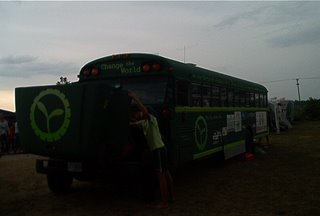 but, I do want to mention a little about veggie oil and biodiesel.
but, I do want to mention a little about veggie oil and biodiesel.There were probably around a dozen or so vehicles which people brought to the fair of which were run on these fuels. Everyone of them that we talked to had great success using these alternatives. In fact most of them told of improved performance and mileage. Not all diesel engines are made the same and they did tell of some that they heard of who have run into problems. But, it seems minor adjustments to engine components and or fuel processing is all there is to working out the kinks.
A veggie powered bus which is traveling cross country.
Between biodiesel and veggie oil, vegetable oil seemed to be the most straight forward and simple one to use. It takes the least effort to process for use in engines by mostly just being run through a series of skimmers and filters. The down side is that the vehicle has to be equipped with two fuel tanks. It has to start off with pure diesel or biodiesel fuels in order to preheat the veggie oil to the proper temperature. Once that point is reached which doesn’t take that long it can be switched over to straight vegetable oil. Everyone said it switches over flawlessly. Not even a sputter or pop. Patrick Klaybor who taught the workshop said his normally noisy diesel truck engine actually quiets down to were it sounds like a normal automobile. He says it is because of the higher “lubricity of the grease”. Biodiesel, though harder to make can be run in an engine using no modifications whatsoever.
During the workshop he talked about a restaurant owner he knows who is using his used cooking oil in all of his pizza delivery cars. The restaurant owner has his place set up with all the proper filtration system
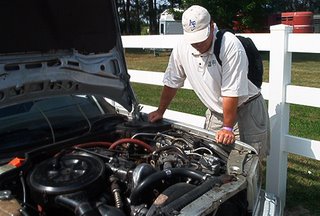
Here's Dan checking out a veggie fueled Mercedes
I currently have a gasoline powered truck for my trash route but, I am seriously thinking about getting a diesel so that I can do the same thing. I’d be able to save nearly $8000 a year myself.
Friend Dan is now looking for an old diesel powered Mercedes which he can use as a project car for this exciting new fuel development. It takes a little modification of the engine. Like I already mentioned above it requires two fuel tanks. It requires a means to switch over from the regular diesel. And needs a couple more filters and a way to heat the oil.
There were guys at the fair who had complete systems for sale. You could buy the components and have them install it or you can do it yourself. We talked mostly to the guys who didn’t have anything to sell. They were just simple folks who were mechanically inclined and had their vehicles there just to display the ways they made it work for them. These guys were hobbyists and advocates of this terrific new way to power a diesel auto or truck. Their set ups cost them anywhere between $400-$1000. With the price of fuel these days it won't take them long to get their money back.
Well, here it is way past my bedtime again. So I’d better wrap this up. My mind is still whirling from all the cool stuff I learned over the past two days. It is different from just reading about it. Seeing it first hand and hearing real experts explain it in person has a way of really sinking in. At least for me it does. It is exciting to know there are so many smart folks trying to make a difference in the world.
Until Next Time


